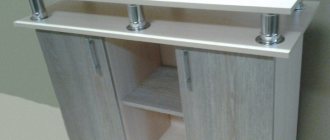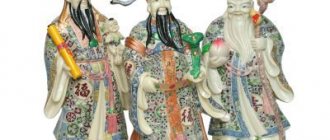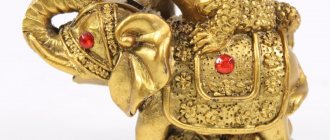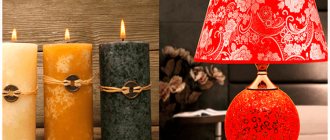Hotei is the god of wealth, fun and happiness. In Feng Shui, Hotei is used to harmonize space and fill a person’s life with joyful moments. Now the Buddha of Abundance is known as the money god, but he is happy to help in other areas: in career, study and even in family matters.
Such souvenirs have long been in demand in the East, but here too these talismans are gaining popularity. To correctly apply an attribute of an unfamiliar culture, you need to know how to choose an amulet and where to place it. Let's understand all these issues.
Feng Shui meaning
God Hotei is a symbol of many similar concepts in Feng Shui:
- Jewels and coins laid out around, as well as a large amount of jewelry on the man himself, indicate wealth and prosperity.
- A belly indicates a calm and measured life without problems or adversity, and a wide smile indicates a constant good mood.
- Almost always, Hotei’s torso and stomach are bare, and there are no shoes on his feet, which symbolizes life in a hot country with a good climate.
- The status of a god speaks of honor and respect from mortals.
Figurine of Hotei
In addition to these well-established symbolic meanings, the laughing Buddha is associated with such concepts as fun, idleness, tranquility, good financial position with a minimum of effort, and the like.
After all, this is Buddha, right?
No, although you are looking in the right direction. Tourists could be forgiven for mistaking the ubiquitous figure for Buddha. By the way, that’s what they sometimes call her - Laughing Buddha. However, the story of the appearance of this cheerful fat man in the lotus position is almost as complex as Buddhism itself.
Denise Leidy is curator of Asian art at the Yale University Art Gallery and held the same position at the Metropolitan Museum of Art for 22 years. She is no stranger to confusion over the Laughing Buddha statue.
What does Hotei bring to people?
The legend about the god Hotei has survived to this day. He was a friendly young man with a good sense of humor and good looks. Earthly girls, seeing him, fell in love with a wonderful man. But there were so many fans that God could not reciprocate all of them. One after another, the girls' hearts were broken. Many committed suicide because they could not cope with grief. And those to whom Hotei nevertheless paid attention did not want to hear about other men.
Old women and mothers began to complain, and young men began to challenge God to fight. Pity for people, and especially for young representatives of the fairer sex, took over, and Hotei decided to radically change his appearance. The luxurious outfit was replaced by a simple cape, thick hair - by a bald head, a beautiful body - by a fat and limp one. Only the character traits remained the same. To make amends to people, from time immemorial he gave them wealth and happiness. It is still believed that the figurine of Hotei gives the owner capital and a wonderful life without big problems or unfortunate changes.
Expert opinion
Melnik Dmitry
feng shui master
In addition, the god of abundance will ensure the happiness of the owner and honor from others. This is only a small part of what the cheerful god can bless people with. In fact, if you choose the right place in the house, Hotei will fulfill almost any desire.
Story
There are several funny legends associated with the god Hotei. Its prototype was a real monk from China who lived in the 10th century. His name was Tsi-Tsi.
But, unlike other monks, he did not like the life of a recluse. Tsi-Tsi traveled a lot, wandered around the country, constantly coming to fairs, bazaars - where there were a lot of people. He made money by predicting the weather or receiving alms.
He had with him only a wooden rosary, a staff and a canvas bag. The other bag was his huge belly, which could not be hidden under any clothing. But the Chinese loved him very much for this - it was believed that it was there that the vital energy of qi was concentrated, and Qi-Tsy had so much of it.
They also loved him for his kind disposition and wide, sincere smile. Wherever the good-natured monk appeared, fun began, and the people around him experienced good fortune, luck and wealth. When asked what he was hiding in the bag, the fat man said that the whole world was hidden in it.
Laughing Buddha
Since then, the world began to call him Hotei. He was depicted in figurines, statues that brought good luck to their owners. It reached its peak of popularity in the Land of the Rising Sun in the 15th century, but even today the decor of any Japanese home is rarely complete without its image.
Another version of the origin of the god of happiness goes back to Feng Shui, which connects him with Buddha Maitreya. Hotei, or as he is called in China, Budai, was a god, very handsome and good-natured. He drove thousands crazy with a woman, but could not be with any of them and, without meaning to, left them unhappy.
To stop the suffering of women, he took the form of a fat, bald deity. And to quench their sadness, he gave each woman happiness, wealth and good luck.
Mascot material
Naturally, the ideal option is gold. However, the cost of such a figurine will be very high. The souvenir market offers the purchase of figurines made from the following materials:
- plastic;
- wood;
- glass;
- polystone;
- marble chips;
- amber;
- bronze;
- natural or synthetic stone;
- precious rocks such as sapphire, emerald and so on.
Preference should be given to one or another mineral, based only on the requirements of the owner. This cannot affect the effect.
How is God portrayed?
The god Hotei with a bag in his hands is considered a trivial image. Today, manufacturers are ready to offer customers figurines in various poses and with various objects. The choice of one or the other depends on the wishes of the future owner. It is worth paying attention to the following:
- A figurine with a lot of money lying around Hotei: for those who want to get a big income. The option with a money bag on the shoulder or in the hands is also perfect for them.
- Sitting or lying down and smiling: for those who want to get rid of life's difficulties and adversities.
- The Buddha of Abundance with a lot of jewelry around the figurine and on himself: for those who strive for a luxurious and lush life.
- Hotya with a cane: for those who want to regain lost health.
If the buyer does not have a clear goal of what kind of help he wants to receive, then he just needs to buy the Hotei statue he likes. In any case, the bulk of the trinkets are accompanied by an abundance of jewelry or coins, as well as a wide smile on the god's face.
Hotei figurine made of mahogany
How to place a figurine in your home?
The answer to the question of where to place the Hotei figurine depends on the person’s desires. You need to position the figure depending on the purpose:
- Face the front door if a person wants to achieve honor and respect.
- In the south-eastern side of the office, if the owner’s goal is wealth and well-being.
- Opposite the bed if you want to find family happiness.
- Next to a jewelry box, if a person strives to possess a large amount of treasures.
- In the zone of wisdom, if there are few children in the family.
It is worth paying special attention to the attitude towards the figurine. Although this is not a real idol, it also requires special attention. It is necessary to periodically wipe the figurine, especially the plump belly of the god. The spiritual state of a person is also important: without true faith in the benefactor Hotei, nothing will happen.
Where to put it?
Before deciding on the place where the figurine will be placed, you need to remember that the apartment must be in order. Only in a harmoniously arranged space will netsuke really work. Clutter and unnecessary things clutter up the space, therefore neutralizing all positive energy. Even if you place a hundred figurines in the house, it won’t do any good.
To better understand where to install the figurine, you can use the so-called Bagua grid. The diagram used in Feng Shui helps to figure out where which zones are located in the house. You can draw a polygon on paper. You just need to determine where the north is in the house and arrange the diagram so that its northern part, which is responsible for the career, coincides with the present north. After this, you can determine the location of Hotei.
It is best to place Hotei with a dragon in the north: since this figurine can help in a career, it belongs in the career zone. Focusing on the purpose of the figurine and knowing what each zone is responsible for, you can easily decide on the location. In the north, you can also place a god on a pyramid of coins.
The zone of wisdom, which is the northeast, can be decorated with a god with a pearl. In this way, it will be possible to further enhance the power of the figurine.
Hotei with children can be located in the east or west. These are the areas that are responsible for children and family.
If the figurine is large and massive, taking up a lot of space, it can be placed on the floor. In all other cases, the figurine should be placed on a table, chest of drawers or shelf so that you can look at it and touch it again.
The figurine not only helps you gain wealth, happiness, spiritual harmony, feel calm and happy, it protects your home from negative energy and bad people. Being a source of positive energy, provided the correct location and physical cleanliness of the space, the figurine will cleanse the spiritual structure of the environment. If you want to protect yourself from bad thoughts and glances from unwanted guests in the house, you can put a figurine right in the corridor. Everything bad will leave the house as soon as it reaches its threshold.
Activation of the Hotei talisman
The activation process will take several days. For some it takes four days, for others it takes a week. First of all, after purchasing a figurine, you need to put it in a beautiful place or decorate it yourself. Chinese coins, embroidery, fresh or dried flowers are suitable. If I like it, my wishes will come true faster.
It is then recommended to rub the belly of the deity. For the first time, five or six revolutions will be enough, and with each subsequent approach you need to increase the number of circles. This should be done without haste, keeping a specific thought in your head. On average, it is recommended to do 300 spins, then the talisman will be activated. But you shouldn’t rub the figure’s belly so many times in one approach. It is better to do several revolutions periodically, then everything will be successful.
If a person unconsciously comes into mental contact with Hotem, it means that the figure has completely mastered the powers of the deity.
How to enlist the help of Hotei?
After a person has learned to contact the Buddha of Abundance on the spiritual and material levels, and the figure has finally become active, one can proceed to the next step. It includes mastering the ability to quickly turn to Hotei for help and receive it without interference.
Hotey with a bag
To do this, they enlist the support of a deity. This can be done with a little trance. It is recommended to stay in the room alone with the figurine, take off your clothes and jewelry and sit opposite. It is important to clear your head of extraneous thoughts and tune in to communication. Then you should rub the bald head of the figurine three times, bow three times and touch the belly of the laughing Buddha.
Next, they advise speaking out loud to Hotei and saying something nice to him. This deity loves flattery, so after kind words he will quickly make contact. This completes the communication process. In the end, you need to catch the wide smile of God and smile back. After such a trance, it is important to show signs of attention to Hotei every day, then God will be pleased and will be happy to help the owner in every possible way.
A small ritual for God Hotei to give wealth
Nowadays, there are several simple rituals that will bring Hotei’s wishes closer to fulfillment. Below are simple and effective ways to appeal to the deity of prosperity and happiness.
If you rub the figurine’s tummy every day, then soon the person will find peace and prudence, and happiness will come with them.
This ritual is not performed immediately after purchasing the figurine. It is better to wait a few days for Hotei to get used to the room and its owner. All you need to do is write your request on paper. It is important to clearly state your thoughts and make a neat inscription. Use a humorous tone, since the laughing Buddha loves perky people. Then fold the note into a small envelope and tie it with two threads. Red and gold silk ropes work best. Next, you need to perform the offering ritual itself. First, light scented candles around. Secondly, sit opposite and relax. Thirdly, offer food to Want. Dried fruits, rice grains or nuts are suitable. There is no need to be greedy, otherwise God will not hear your requests. Then place notes in front of the figurine and mentally call upon the laughing Buddha.
Belief in the power and kindness of Hotei has accompanied humanity since ancient times. Over the past few centuries, God has shown his generosity more than once. Who knows who will be lucky next time.
Magnet of abundance
Over time, Budai became an object of devotion in Zen Buddhism in both China and Japan, where he goes by the name Hotei. Its large belly and pouch are believed to represent abundance. He is one of the seven lucky gods of Japan as a harbinger of prosperity and health.
At some point, he also became the patron saint of restaurateurs and bartenders, so it is not surprising that he can often be seen next to the cash register. Leidy is unsure of the exact historical origins of today's Laughing Buddha statues, but she believes that images of Budai began to appear in the 15th century.
Have you ever seen a figurine of this cheerful fat man?











